Suppose that you were to give a thousand people a million dollars. Each. What would happen? Well, I would lay good money that many of them would not be a millionaire tomorrow. Let me propose three types of people:
1) There is a person who, given a million dollars today, would not be a millionaire tomorrow. He would take the money, pay off his debts, and go splurge.
2) There is a person who, given a million dollars today, would not be a millionaire tomorrow. He would give money to his church or his family and go on with his life.
3) There is a person who, given a million dollars today, would be a millionaire tomorrow. He would have called up his broker, explained about the windfall, and invested the money. Wisely.
There are also a hundred different people. A hundred different reactions to the gift of a million dollars.
Introduction
This post is in the ‘patriarchy’ thread, but it is not in response to anything from JS Kasimir. It is, instead, in reaction to some remarks I have heard about that thread, and is a review, restatement, and meant to add depth to that argument. The argument concerns what is ‘intrinsic’ to human nature and creation, and my point has been that differences make differences.
So here I am going to present a more science fictiony look at how differences make differences, and the result of those differences.
A thousand people
Suppose you were to take a thousand randomly chosen 18-year-olds and transport them to some new colony, erasing their memories along the way. You drop them in this new colony, all alone, with some supplies to last them till the next harvest and some instructional videos (suitably redacted) teaching them how to plough, give birth, etc etc. What would happen… tomorrow?
Like the millionaires, these young people would be faced with an open future. A future of new possibilities. Ignorant of the millennia of oppressive patriarchy, they would be free to set up their own society!
Or would they? If you lined all thousand of them up by height, with males on one side and females on the other, tallest on one side, shortest on the other… and had them all walk together and form couples, you would find that the male of the couple would be taller than the female, almost exclusively. He would also probably be heavier. He would also have greater lung capacity, greater upper body strength, yada, yada, yada… and be able to pee standing up.
So, even just getting started, before anyone had done anything, the male v female difference would be obvious.
Work
Now, lets get people started working. Two issues are going to raise their heads right away… ability and desire. I’m not going to make any specific predictions since I don’t exactly have a new colony to experiment with, but I am going to guarantee a general prediction… the differences will make differences. The taller, stronger, more lung capacity and able to pee standing up crowd who have different brain structures and different hormones, will choose and do well at different jobs than the shorter, etc etc, females.
Not all of them all the time in everything, but enough of them enough of the time in enough things to make statisticians sit up and take notice.
Pairing up
Now we come to the evening. Everybody has been working on their jobs all day, and now they are sitting around the fire, talking to one another and… well… chemistry. Their memories might have been erased, but their hormones were still active and, besides, some of those educational videos…
So they start ‘pairing up’. And since this is a thought experiment, we need to ask ourselves… how would that work? When the female colonist looks across the fire, or sits on the lap, of the male colonist, what would she be thinking of? Indeed, lets go underneath her conscious thoughts and make a guess about her unconscious thoughts, her instincts.
Instinctively, her thoughts are going in two different directions. First of all, she is instinctively evaluating him for genetic fitness. Her brain pathways are wired to seek the ideal healthy man.
But secondly, similar pathways are attempting to make a social judgment. ‘If I make a baby with this man, will he stick around and help me raise him?’
I believe that both of those two judgments are well-known and obvious, although certain highly civilised societies might have found ways to pervert some of them. Maybe. Partially.
So even before that young man opens his mouth to suggest that the two of them spend some time together, alone, aAnd even with all of her memories wiped, she is still evaluating him in a way that would make the most diehard patriarchs proud.
Now, let's turn our thoughts to the male’s subconscious thoughts. No, not those thoughts; those are obvious. But he, too, is evaluating the female on the subconscious level thinking almost exclusively about health, genetic health, and fertility. A woman who is obviously ill is not attractive. A woman who is ugly is either genetically unhealthy or lacking the signals of fertility.
This is a hard pill for moderns to swallow. To seriously and honestly examine those issues will involve chucking out layers upon layers of modern propaganda about what a man and a woman should be looking for in a spouse.
It involves honestly looking at what is involved in the physiological reactions and what lies behind linguistic conventions. When a man describes a woman as ‘pretty’, ‘beautiful’, ‘sexy’, or ‘hot’, what are the actual attributes and qualities behind those words? I believe that both science and common sense teach us that they are health, genetic health, and markers of fertility. These may just be disguised, altered, or augmented, but they are what the male is instinctively looking for.
Similarly, the female is instinctively looking for a male who will produce good babies, and stick around to help raise them successfully.
In other words, when the two exchange glances across the fire, they are evaluating each other instinctively using patriarchal values. Will this man or this woman help me produce plentiful, successful children?
Children
Speaking of children… after the enchanted evening around the fire it’s about time for us to start speaking of children. “What?” I can hear my audience howling, “What about contraception?” No contraception, it’s a colony! Do the math. In order to form a successful colony, the first few generations of colonists will need to breed like bunnies. (Not literally like bunnies, because our generations take longer. A few hundred years of bunny breeding… Anyway, like the human equivalent of bunnies… no contraception, lots of sex.)
And as soon as the first woman gets decently into her pregnancy and starts hurling into the outhouse (or colony equivalent), then everything we talked about in the ‘work’ section will rear its ugly head again. (No, you don’t look ugly, dear. Pregnant women look especially beautiful. They have this glow…). Suddenly, there will be yet another difference, or yet more differences, between the male and the female workers. Even without any patriarchal history influencing their lives and choices, there will start to be yet another gulf between the male and female workers. Before, she had a harder time reaching high shelves, had less upper body strength, and had to squat while peeing… now she is also sick every morning has to pee more often… (feel free to look up all of the symptoms of pregnancy, assuming you haven’t lived through them).
AND, as the instructional videos pointed out, whenever you see her, you are seeing two people. She is literally carrying the future of the colony in her womb. Her breasts are beginning to swell in preparation for feeding the new colonist. Only an utter fool would not look at her differently, and, again with the instinct, the males will be even more inclined to protect her.
Marriage
No, this isn’t out of order. Do you really think that with their memories all wiped, people will start coming to ceremonies and singing ‘Here Comes the Bride’? I’m talking about what will happen, either after a few sexual encounters or after she is pregnant or after he starts helping her more… somewhere along the line, and I will make no prediction as to when, but I do have literally all of human history to back me up here… men and women will start pairing up. A woman will say ‘my man’, proudly when he brings home the gazeballope he has hunted, or a man will say ‘my woman’ when some other guy’s eyes get a bit too intense around the evening fire. Fights may well break out… physical ones between the men, verbal ones between the females. Subtle understandings will become plain speaking, will become social custom.
Fatherhood
No, this isn’t out of order either. Assuming that the couple ‘marry’, and the man continues his responsibilities, and the child gets older… then the father starts having authority over her. At first the little nipper just sits there and cries and suckles and pees and poops and what guy wants to have anything to do with that? But the day will come when she will start crawling too close to the fire, and he will say ‘no’, and she will look at him with incredulous eyes… how can her little will be thwarted?… and he will whack her hand that was reaching for the fire, or pick her up by her nappy and move her away… and it will dawn on her that there is more than one big person who feels he has the right to tell her what to do.
And as she gets older she will discover that besides the one with the breasts that feeds her, there is one rather deficient in breasts who hangs round a lot more often than the others and seems to enjoy spending time with mommy (some form of that word is incredibly linguistically natural, actually) and seems to feel that he has even more right than every other big person to tell her what to do. Perhaps because he is just there so much more often. Or perhaps because… instinct. Or perhaps… add your reason here, but would you wish to bet against it?
Inheritance
No, no one is dead yet, although that is no doubt coming. But our little girl will find out, as she grows up, that she is in a different position than all of those other little girls. (And boys, but she thinks they are weird.) Her ‘mommy’ and her ‘daddy’ are different from all of the other mommies and daddies in hundreds of big and little ways, and as a result, her growing up is different, was different, will be different than all of those other children. Perhaps she gets to eat more gazeballope, because her daddy is so good at hunting them. Perhaps she isn’t as good a singer, since her mommy can’t sing her way out of a tin can. Perhaps, perhaps….
Her genetics, her training, the opportunities that she will have will differ in hundreds of ways, big and little, from the other children. Perhaps she will become a good gazeballope skinner because she had so much practice growing up (and was so proud of her daddy because he was such a good hunter). Perhaps, perhaps… but what is certain is that she will receive and did receive thousands of different gifts and opportunities than even the others in her own family.
Conclusion
Man and woman, child and parent, even child vs child, are not equal. Mankind is designed (feel free to substitute ‘evolved’ if you so wish) in such a way as to incorporate and perpetuate that inequality, indeed those inequalities.
I think it is time for me to update my definition, including everything that I have addressed. Thus:
A patriarchal society is one in which fathers rule. It is society with strong family jurisdiction, one where the having and raising of children with clear paternal line is considered extremely important and where the male head of multiple households, even after he is dead, continues to have strong actual authority. People actually do what he says. Father-ruler.
The ‘father-rule’ includes the authority of those who are adjacent to the ‘father’. Thus, the grandmother, who is adjacent to the grandfather. The young wife, the mother of the father’s children and the chatelaine of his house. The son of the house, whose word can be expected to bind his father, and who may inherit his father’s wealth and his authority. Even a leader of industry or culture might be metaphorically ‘adjacent’ to a father: thus George Washington, a childess male, was still considered the ‘father’ of his country.
This ‘rule’ consists in the formation and passing down of societal values and will be reinforced by the success of a society, ie one which reproduces itself physically (ie has enough children to replace the previous generation and grow), reproduces itself socially (the children continue the values of the society), economically (the society is not able to be crushed by its rivals economically), and militarily.
Some of that definition is tautological. A society which is not reproducing itself in all of those ways is a society which stops being a society. But much of that definition is worked out through the nature of men and women, fatherhood and motherhood, inheritance and training.
Patriarchy is natural and inevitable. Its values will not be worked out in the same way in all societies or even any society. But the foundational concept of ‘father rule’ is inevitable over the long march of history. Societies which stray too far from its precepts will die. Some quickly, some more slowly, but they will all die, crushed in the jaws of history.
Links
What is Marriage?
Imagine, if you will, a species that is divided into two distinct types. Imagine that each of the types has (on average) different traits. Imagine that the species produces these types in approximately equal numbers. And imagine, if you will, that in order for this species to reproduce, it takes one of each of the types…
Links
Blessings of the Breasts and the Womb
·
DECEMBER 14, 2023
The Inevitability of Patriarchy
·
DECEMBER 7, 2023





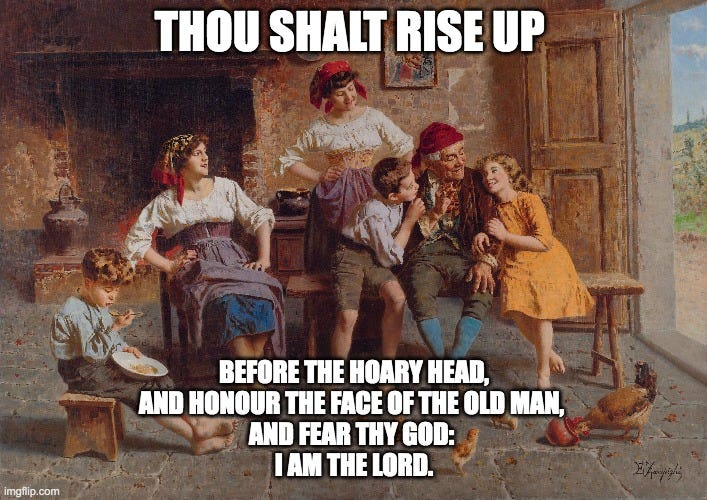
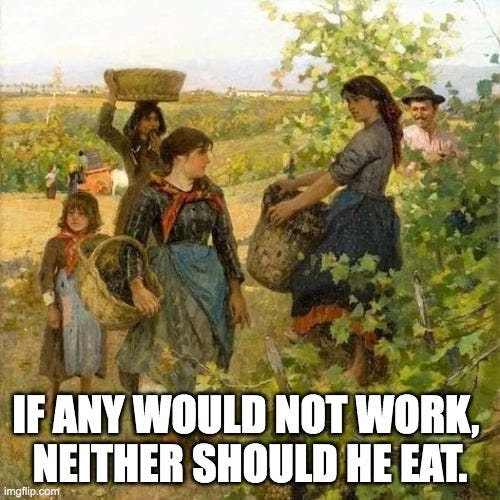

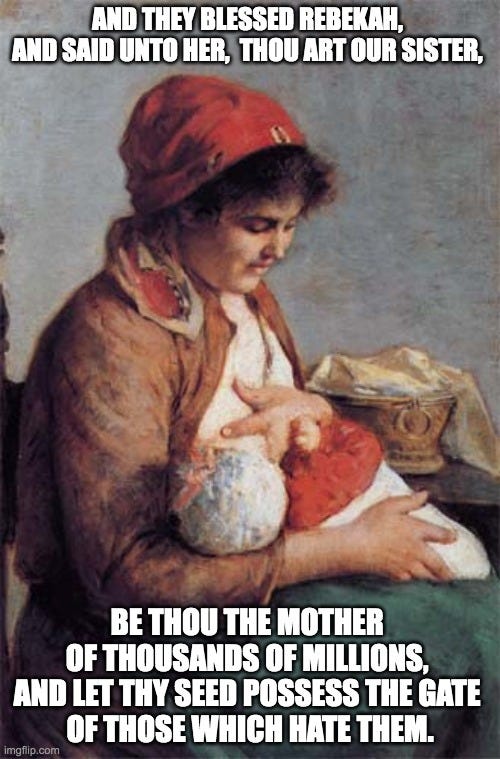


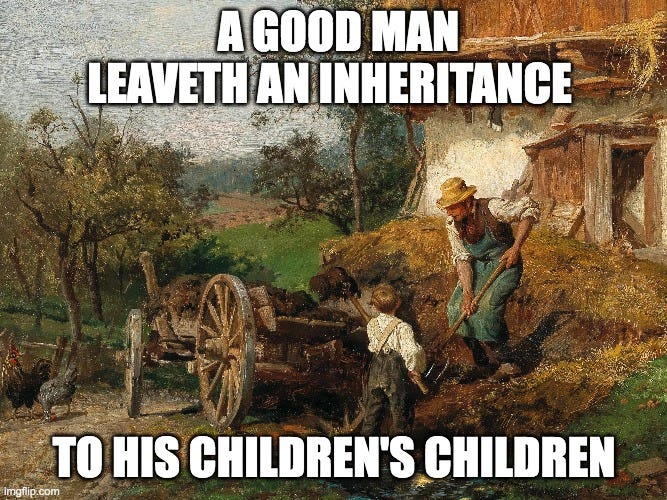

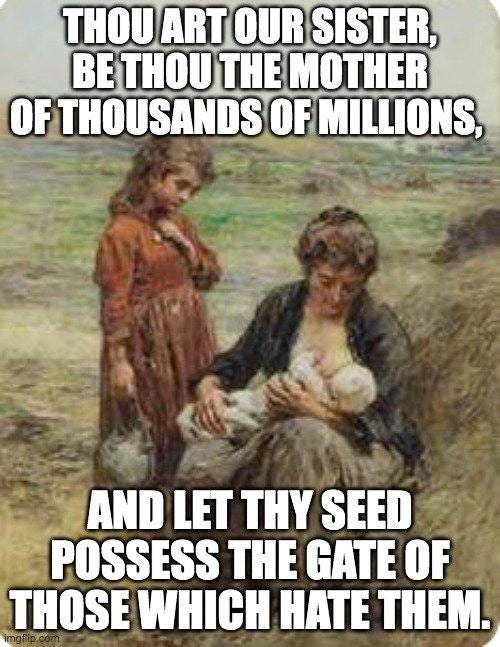

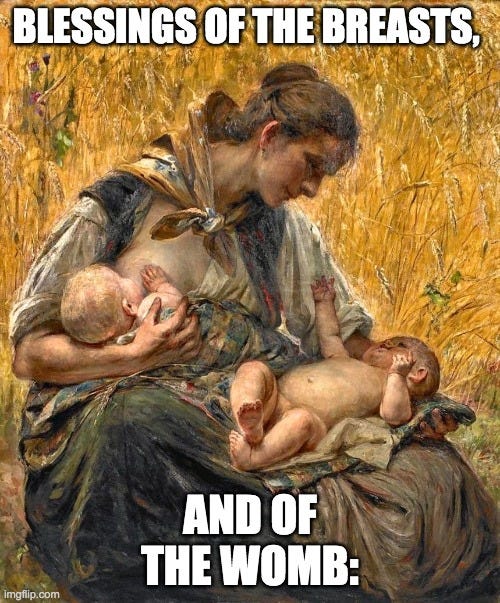
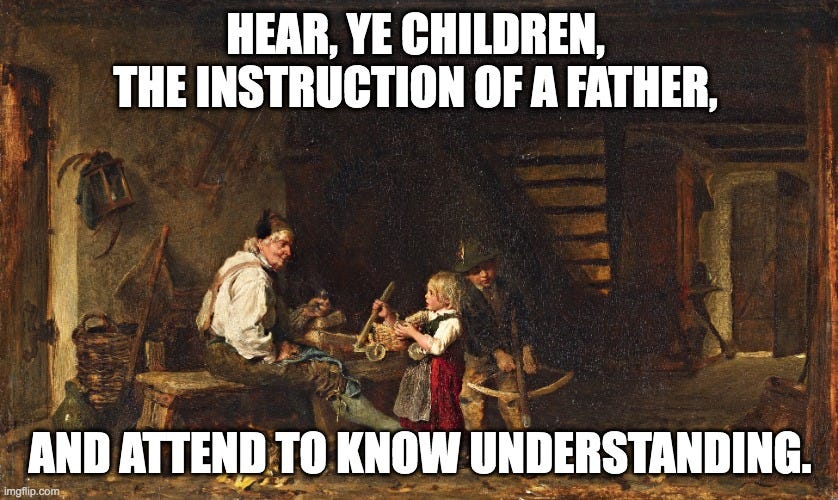
This is an excellent and accessible breakdown of sex differences and how they appear in and affect society. I've spoken to at least a dozen young women who firmly believe that the lack of female STEM majors is some artifact of sexism... yet none of them was a STEM major and they all COULD have been (in that they all had an open pathway to that choice).
We should focus on instances where bigotry or hard institutional barriers or measurable differences in resources are leading to a waste of our collective human capital. There are plenty of such cases extent now and we should care about them more than we should about our irritation that 'x' group is not 'represented' in 'y' field at 'z' level. Open the gates of competition, by all means. But if you're a female sociology major and you think that a paucity of female STEM majors is a real social problem there is one thing you can today today to begin addressing it... and it's not writing editorials or complaining. Switch majors.
If you can't name the rule or policy or norm standing in the way of progress it might be time to admit that there's no social problem here at all-just mean differences in preference and priority.